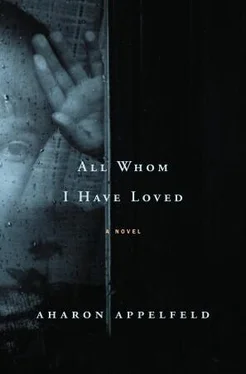Now I hardly ask, and I just wander along the side streets. When this tires me, I curl up in bed and sleep for several hours.
“I can't find a woman to look after you,” Mother says in an empty voice on her return.
“There's no need,” I answer coldly.
“You aren't bored?” Again, that superficial voice.
“No.”
Once Mother would have told me stories or read to me or sat quietly by my side. Now it seems that it's not her sitting next to me but another woman. My real mother has slipped away and left me with this awful substitute, and every word that comes out of her mouth wounds me. Sometimes I want to shout out, “You're not my mother!” I contain the fury in my heart by telling myself, “It's better that I hold it in; in only a few days Halina will wake up from her sleep and I'll run away with her.”
It gets colder each day, and in the morning frost glitters on the grass. But this doesn't stop me from going to the hospital every day. Sometimes I think that the man at the information counter understands me and wants to help me, but the nurses, who wear yellow uniforms, refuse to cooperate.
Every evening, Mother's mindless chatter makes my blood boil. For some reason, she's sure that Halina won't return to us. Too many days have passed since she lost consciousness. She calls Halina's sleep “a loss of consciousness,” and to me that sounds as if she's refusing to believe that Halina will come back. “She'll come back soon,” I say, not hiding my confidence from her.
Mother says, “It's not good to harbor illusions”—words she has already used. They grated on my ears then, too.
Since she has been teaching at the school Mother uses words that she didn't use before. Like “to harbor,” and “treatment and development,” and other words that freeze my heart. Mother would correct Halina's German, but I loved the timbre of her voice and the way she pronounced the words. When she said, “Come, let's put on your coat,” I felt that the two of us would wrap ourselves in it and that no one else would see us, but that we would see everyone.
Day after day, fierce rain continues to fall, and it's hard to get to the hospital. The water rushes down the streets, drawing mud with it. At times the rain becomes hail and lashes my face. I have a raincoat and boots that cover my feet, but I rarely use an umbrella. The umbrella comes between me and the sky, between me and people in the street. It's better to get wet and be able to see than to walk like a blind person — that's what I learned from Father. Father has a large umbrella, but he seldom uses it.
After visiting the hospital, I wander for about three or four hours and return home soaked, but there is something special to this dampness. I sleep differently. In my dreams I run with Halina. Running with Halina is brisk and joyful, and, as she always does after we run in the rain, she strips off my wet clothes and puts me in dry ones.
I've noticed that in recent days Mother returns early and prepares a huge dinner. After that she sits and talks to me about school. She is not in a hurry, and she seems calmer and less distracted. What has happened? I'm suspicious and prick up my ears. Sometimes André comes and joins our meal.
One evening Mother raises her head, looks at me, and says, “I want to tell you something.”
“What?”
“André and I have decided to get married.”
“When?”
“Soon. Are you angry?”
“No.”
I had known that a heavy blow would come but had no idea from where. I get up, go over to the sideboard, take out my wooden balls from the drawer, and put them on the floor. Halina brought me these balls from the village, and we would play with them for hours. I haven't touched them for a while, but now it seems to me that they bear a secret, that they can be trusted. I start rolling them, just as Halina taught me.
Later Mother asks me, “Would you like to be at the wedding ceremony?”
“I don't know.”
“You don't have to.”
We don't talk more that night. I sit on the floor and roll the balls. The thought that Halina will soon be well and that I will run away with her to her village gives me secret joy, like a sweet dream. Mother grades her notebooks and I play. I know that this night, too, I will hear her footsteps as she slips away. She will walk on her tiptoes, open the door carefully, and muffle the creaking. These sharp and tense moments wound me: I feel intensely sorry for myself and want to cry. Once I had a mother. That was long ago, for now she belongs to André. She gets undressed and they kiss each other and roll on the bed. This knowledge drives me mad, and I want to shout “Murder!”—just as the neighbors shouted when they saw Halina weltering in her blood. I feel sorry for my father; he wastes all his money on drink. He doesn't even have the money to visit me. He must know that Mother is about to marry and so he drinks even more. “Father!” I call out. For an instant, the darkness trembles and shadows flee from the walls. I am sure that Father has heard my cry and that he will come and visit me soon. Whenever I really long for him, he comes.
Mother returned toward dawn. She took off her clothes, put on a nightdress, and lay down next to me. I turned my back to her so she couldn't look at me. I didn't like it when she looked at me or hugged me.
In the morning she hurried off to school and barely kissed me. I remembered the long summer vacation we spent together on the shores of the Prut, and my heart bled. Now, instead of that closeness there were just some blurred patches of memory and a feeling of uncleanliness.
Sometimes I felt that Mother wanted to crawl out of her skin and come back to me, but she was trapped inside the movements she had picked up from André. She called them her flexibility exercises. But it was hopeless — they really didn't suit her. She must have been exercising with him, or who knew what. I, at any rate, made my peace with the fact that she was no longer my mother. I was very upset that she pretended that nothing had happened and she said, “In the winter we'll travel to the Carpathians and we'll go skiing.” I hoped that in winter I'd be very far from her and her lies.
In the meantime, the rains ceased and low mist-like clouds crawled between the houses and the alleys; the wetness seeped into everything. I wanted to go into the café and sit amid the tobacco smoke, as I used to sit with Halina not so long ago. Halina had said something to me then that stayed in my mind: “Jews are hardworking and that's why they do well.”
“And will I also do well?” I hastened to ask.
“I don't doubt it for a moment,” she said, and chuckled.
She also laughed when she told me about injustice and pain.
Without being aware of it, I had reached the hospital. The forecourt was empty, but beneath the awning the homeless and the drunks had gathered. They immediately spotted me and shouted, “Here's the Jewish dwarf!” I was surprised; I had never been called anything like this before, and I wanted to laugh, but I understood soon enough that it wasn't a joke. A stone was thrown, and it hit my thigh. I wanted to run away, but my legs told me to seek shelter in the building, and that's what I did.
“How is Halina?” I asked the man at the information counter and waited for his usual answer.
“She is no longer in pain.” He leveled his gaze at me.
“Is she better?”
“She's already in heaven,” he said, and removed his cap from his head.
I did not know what his look meant, and I stared at him.
“She's already in heaven,” he repeated in a soft voice.
I then understood, but I didn't want to understand. “She's still sleeping?” I asked.
Читать дальше












